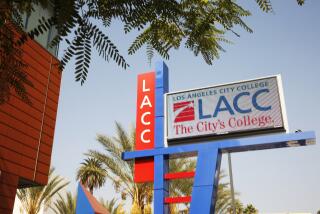Antioch College alumni plan to save their school
- Share via
YELLOW SPRINGS, OHIO — Lawn signs and bumper stickers around town still rally support for Antioch College -- an academic icon of the 1960s counterculture and the civil rights and antiwar movements that ran out of money and closed more than a year ago.
The dream of bringing the college back has never wavered among the residents of this Ohio village of 3,800. The school and its owner, Antioch University, were among the largest employers in Yellow Springs, and many alumni have never left: At least 1 in 5 people attended the college or had family that did.
“I haven’t talked to anyone who doesn’t want the college back,” said Tom Gray, owner of Tom’s Market, the village’s grocery store. “It’s a part of the town’s identity. Losing it was like losing a limb.”
A group of alumni has raised nearly $6.2 million to purchase the 1,300-acre campus and plans to open the school again in 2011 with a freshman class of 120.
The deal is expected to close by the end of the week. The college will retain the Antioch name but will no longer be part of the Antioch University network, which includes campuses in Culver City; Santa Barbara; Keene, N.H.; and Seattle.
“There’s a lot of pride here in Yellow Springs being a college town, and a lot of relief that it’s going to stay a college town,” said Aimee Mayurama, 36, a village native who graduated in 1995 with a degree in environmental science. She’s been named director of alumni relations for Antioch College Continuation Corp., the nonprofit group formed to take control of the school.
The group has raised $10 million more this year to help get classes up and running -- a sum gathered from change tossed into buckets at local fairs, donations from unemployed former students and heftier checks written by wealthy donors.
Still, there’s much work to be done.
Faculty must be hired, and the school must be solvent enough to instill confidence among future donors and would-be creditors. Organizers want to raise an additional $40 million to help establish a strong operating budget.
“Everyone wants to know what’s coming,” said Matthew Derr, the chief transition officer for Antioch College Continuation Corp.
Derr, 42, who graduated in 1989 with a history degree, added, “What they really want to know is, can the institution be financially perpetuated? Or will it fail again?”
The campus needs to be physically overhauled. Even before the college closed in June 2008, it had suffered from years of neglect.
Many of the school’s structures have crumbling mortar or missing chunks of brick. Animals have nested in some of the dormitories. Over the last winter, water pipes burst and flooded the Main Building and South Hall -- both listed on the National Register of Historic Places.
Antioch College, founded in 1852, was one of the nation’s first coeducational institutions of higher education. It was the first to name a woman as a full professor. Set in a village that was one of the final stops on the Underground Railroad, the school was one of the first to eliminate race as an admission requirement.
Its first president was congressman and education reformer Horace Mann, and its alumni include civil rights activist Coretta Scott King, actor Cliff Robertson, screenwriter Rod Serling, biologist Stephen Jay Gould, playwright Herb Gardner and Nobel Prize-winning scientist Mario Capecchi.
The school became known for educating artists, activists and nonprofit organizers. By the 1960s, the college -- as well as the village -- had evolved into a haven for radical thinkers and social reformists, surrounded by the cornfields of conservative western Ohio.
But the school’s financial woes mounted steadily from the 1970s. Its endowments shriveled.
When news came in 2007 that the campus would close, enrollment had plummeted to less than 300, down from a peak of more than 2,000.
Village officials said 716 people lost their jobs when the college closed, which led to a 16% drop in the town’s tax revenue.
The recession only made things worse. Tourists continued to flock here, drawn by the community’s Berkeley-like culture and downtown lined with organic food cafes and New Age spas, but they spent less.
Now, as news spreads of the impending sale, there’s a tangible excitement in town. Derr can’t step onto Xenia Avenue, the village’s main street, without being stopped and peppered with questions.
“When’s it going to open?” hollered one person walking out of the post office.
Lee Morgan, a village native and grandson of former Antioch College President Arthur Morgan, said it was heartening to see how much the college meant to the town.
When the college closed, “people in the village started to ask, ‘Is this really that important?’ ” he said. “The answer was yes.”
--
More to Read
Sign up for Essential California
The most important California stories and recommendations in your inbox every morning.
You may occasionally receive promotional content from the Los Angeles Times.










